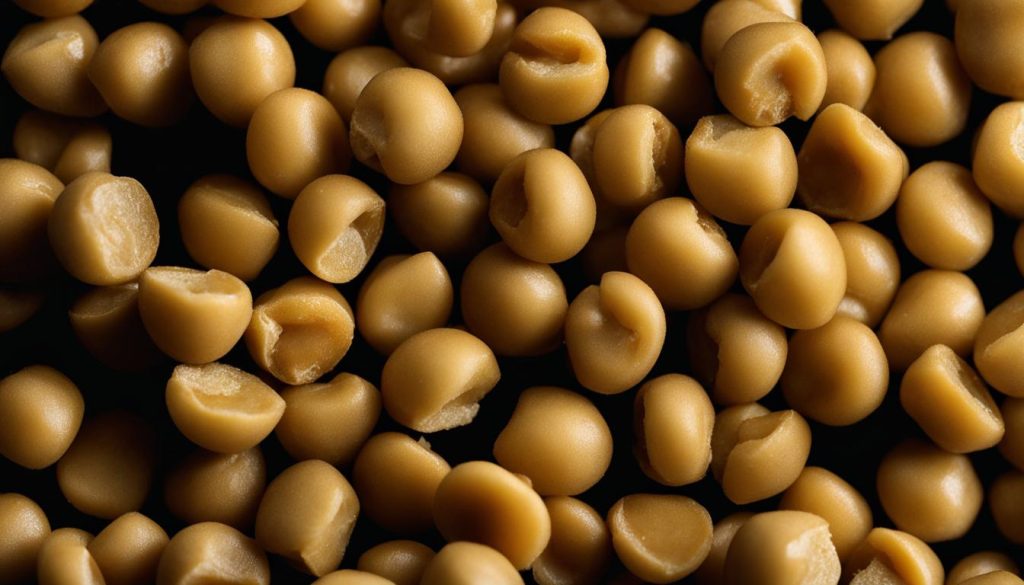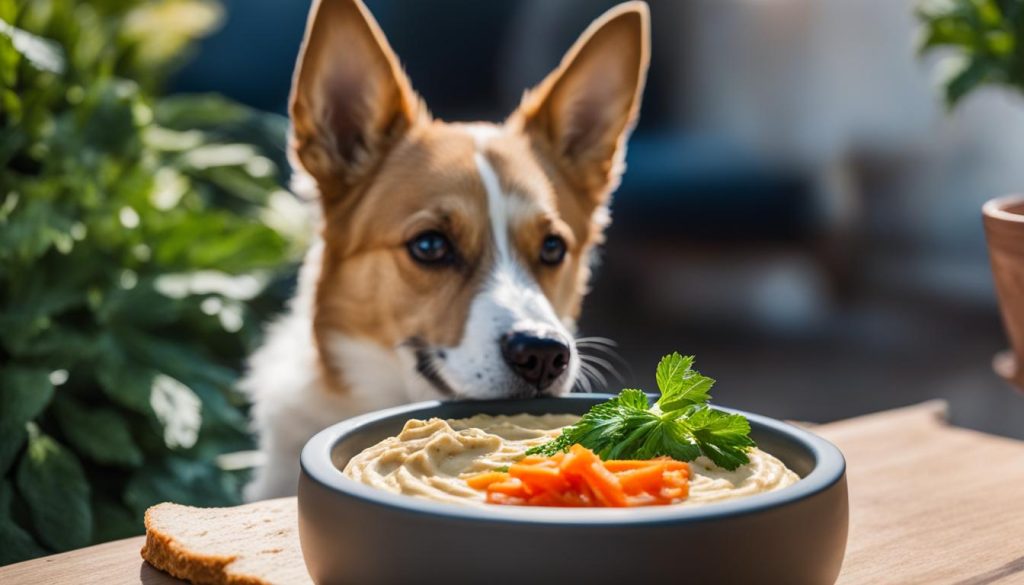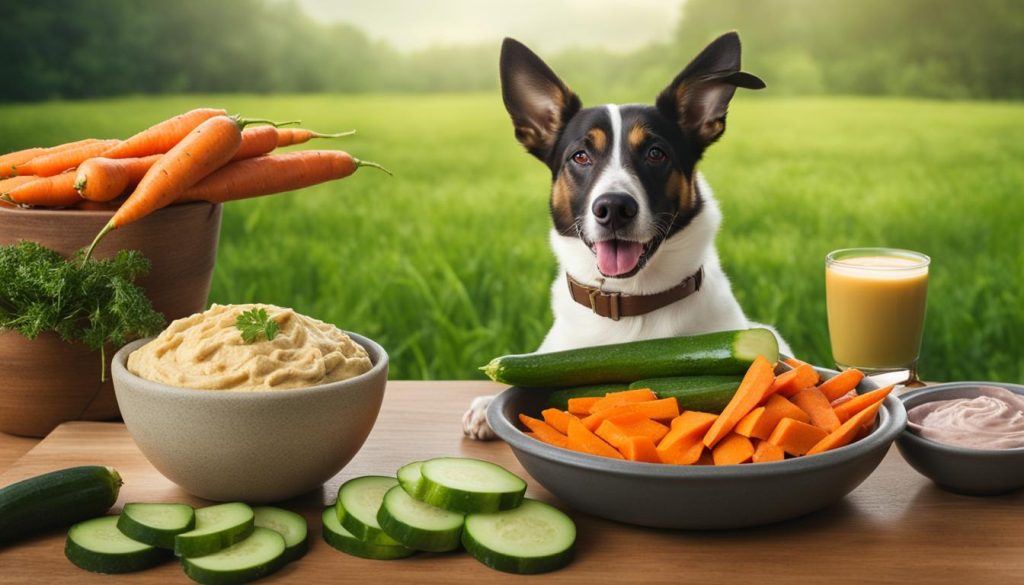Hummus, a popular dip made from chickpeas, tahini, olive oil, and spices, is a snack enjoyed by many. But is it safe for dogs to eat? In this comprehensive guide, we will explore the potential risks and benefits of feeding hummus to your furry friend.
Key Takeaways:
- Dogs should not consume hummus due to potential risks associated with ingredients like garlic, lemon juice, and high salt content.
- Garlic in hummus can damage a dog’s red blood cells and internal organs.
- High sodium content in hummus can lead to sodium poisoning in dogs.
- Puppies are especially sensitive to the harmful effects of ingredients like lemon juice and salt, so they should not eat hummus.
- Safe alternatives to hummus for dogs include plain, cooked chickpeas, pureed pumpkin, nut butter without added ingredients, and steamed vegetables.
It is crucial to prioritize your dog’s health and consult with a veterinarian before introducing any new food to their diet. By making informed decisions, you can keep your furry friend safe and happy.
What’s In Hummus?

Hummus is a popular dip made from a combination of ingredients. Let’s take a closer look at what goes into this flavorful spread:
- Chickpeas: The main ingredient in hummus, chickpeas, also known as garbanzo beans, are safe for dogs to eat. They provide antioxidants that boost the immune system.
- Olive Oil: Another component of hummus is olive oil, which can offer some nutritional benefits for dogs. It is a good source of healthy fats.
- Tahini: Made from ground sesame seeds, tahini is commonly used in hummus. While it can provide some nutritional benefits for dogs, caution should be exercised due to its high fat content.
- Lemon Juice: Lemon juice is a common ingredient in hummus, but it can be harmful to dogs. It can cause stomach upset, vomiting, and potentially more severe health issues.
- Garlic: Garlic is often used to enhance the flavor of hummus. However, it is toxic to dogs and can cause damage to their red blood cells and internal organs.
While some components of hummus can be safe and provide nutritional benefits for dogs, it is important to be cautious about the ingredients that may be harmful. Now that we know what’s in hummus, let’s explore whether dogs can eat it.
Table: Ingredients in Hummus
| Ingredient | Safety for Dogs |
|---|---|
| Chickpeas | Safe, provide antioxidants |
| Olive Oil | Safe, provide healthy fats |
| Tahini | Use with caution due to high fat content |
| Lemon Juice | Harmful, can cause stomach upset and more severe health issues |
| Garlic | Toxic, can cause damage to red blood cells and internal organs |
Can Dogs Eat Hummus?

While dogs can technically eat hummus, it is not recommended for their overall health and well-being. Hummus contains ingredients that can be harmful to dogs, such as garlic, lemon juice, and excessive salt content. These ingredients can cause gastrointestinal issues, including stomach upset, vomiting, and diarrhea. In some cases, the consumption of hummus with garlic can lead to damage to a dog’s red blood cells and internal organs. Therefore, it is best to avoid feeding hummus to your furry friend.
If you want to provide your dog with a tasty and healthy alternative to hummus, there are dog-friendly recipes you can try. A simple and nutritious option is to make a dog-friendly hummus-like dip using safe ingredients. One recipe involves blending cooked chickpeas with plain yogurt and a small amount of olive oil. This homemade dip provides protein and healthy fats while avoiding harmful ingredients like garlic. Remember to introduce any new food gradually and watch for any adverse reactions.
Please be aware that dogs have specific dietary needs, and their nutritional requirements differ from humans. While hummus may be a tasty and nutritious snack for us, it does not offer the same benefits for dogs. A balanced and complete diet formulated specifically for dogs is the best way to ensure they receive all the necessary nutrients they need for optimal health. Always consult with your veterinarian before making any significant changes to your dog’s diet or introducing new foods.
The Risks of Feeding Hummus to Dogs:
“The potential dangers from harmful ingredients like garlic, lemon juice, and salt outweigh any potential benefits. Dogs that consume hummus with garlic or high salt content can experience gastrointestinal irritation, vomiting, diarrhea, and other health issues.”
Dog-Friendly Hummus Recipe:
- Ingredients:
- 1 cup cooked chickpeas (without any additional seasoning)
- 1/4 cup plain yogurt
- 1 tablespoon olive oil
- Instructions:
- 1. Blend the cooked chickpeas, plain yogurt, and olive oil together until smooth.
- 2. Serve a small amount of the homemade dip as a treat or a topping for your dog’s regular food.
- Note: Monitor your dog for any adverse reactions and consult with your veterinarian if you have any concerns.
Dangers of Hummus for Puppies

Puppies are adorable and curious creatures, but when it comes to their diet, extra caution is necessary. While hummus may be a delicious and healthy snack for humans, it can pose significant dangers to puppies. Here are some reasons why you should avoid feeding hummus to your furry little friend:
- Potential toxic ingredients: Hummus often contains ingredients like garlic and lemon juice, which can be toxic to puppies. Garlic, in particular, can cause damage to their red blood cells and lead to serious health issues. The high salt content in hummus is also not suitable for a puppy’s developing digestive system.
- Sensitivity to ingredients: Puppies have more sensitive digestive systems compared to adult dogs. The ingredients in hummus, especially lemon juice and salt, can cause stomach upset, vomiting, and diarrhea in puppies. It’s best to stick to a diet specifically designed for puppies to ensure their nutritional needs are met without any adverse effects.
- Focus on a balanced puppy diet: Puppies require a well-balanced diet to support their growth and development. Feeding them hummus can disrupt this balance and potentially lead to nutritional deficiencies. Instead, opt for puppy-appropriate foods and treats that are formulated to meet their unique dietary requirements.
In summary, it’s crucial to prioritize your puppy’s health by avoiding the temptation to share hummus with them. Stick to a puppy-specific diet and consult with your veterinarian for proper guidance on what foods are safe and appropriate for your furry companion.
Dangers of Hummus for Dogs
Feeding hummus to dogs can pose several dangers to their health. The ingredients found in hummus, such as garlic, lemon juice, and excessive salt, can have negative effects on dogs. Garlic, in particular, can cause damage to dogs’ red blood cells and internal organs. The high sodium content in hummus can lead to sodium poisoning in dogs, resulting in gastrointestinal irritation, vomiting, diarrhea, and other health issues.
To illustrate the potential dangers of hummus, the following table highlights the harmful effects of garlic and excessive salt on dogs:
| Ingredient | Negative Effects |
|---|---|
| Garlic | – Damage to red blood cells – Internal organ damage |
| Salt | – Gastrointestinal irritation – Vomiting and diarrhea – Sodium poisoning |
As responsible pet owners, it’s important to prioritize our dogs’ well-being and avoid putting them at risk. While hummus may contain some nutritious ingredients, the potential harm outweighs any potential benefits. It is best to err on the side of caution and keep hummus away from our furry friends.
Is Hummus Good For Dogs?

While hummus may offer some nutritional benefits for humans, such as protein and dietary fiber, it is not considered a beneficial food for dogs. The potential dangers from harmful ingredients like garlic and lemon juice outweigh any potential benefits. It is important to ensure that dogs receive a well-balanced diet with appropriate protein and fiber sources that are specifically formulated for their unique nutritional needs.
Dogs require a different dietary balance than humans, and their digestive systems may not be able to process certain ingredients found in hummus. Garlic, for example, contains compounds that can be toxic to dogs and can cause damage to their red blood cells and internal organs. Similarly, lemon juice is acidic and can cause stomach upset and other digestive issues in dogs.
Instead of incorporating hummus into your dog’s diet, focus on providing them with dog-friendly alternatives that offer similar nutritional benefits. For example, plain, cooked chickpeas can be a safe option as they provide protein and fiber. Other alternatives include pureed pumpkin, which can aid in digestion and provide nutrients, and nut butter without added ingredients like salt or xylitol. Additionally, steamed vegetables like green beans and carrots can serve as healthy and tasty treats for dogs.
| BENEFITS OF HUMMUS FOR DOGS | NUTRITIONAL BENEFITS |
|---|---|
| Protein | Chickpeas, the main ingredient in hummus, are a good source of protein for dogs. |
| Fiber | Hummus contains dietary fiber, which can promote healthy digestion in dogs. |
| Antioxidants | Chickpeas in hummus provide antioxidants that can boost a dog’s immune system. |
| Vitamins | Some vitamins found in hummus, such as vitamin C, can be beneficial for dogs in small amounts. |
While these alternatives can offer nutritional benefits, they should be given in moderation and as occasional treats, rather than as a substitute for a balanced dog food diet. It is always recommended to consult with a veterinarian before introducing any new food to your dog’s diet to ensure it is safe and appropriate for their individual needs.
Is Hummus Safe For Dogs?

Feeding hummus to dogs raises concerns about their safety due to the potential risks associated with certain ingredients. While hummus can be safe for dogs in small amounts, it is crucial to exercise caution and moderation when including it in their diet. The primary ingredient in hummus, chickpeas, can provide some nutritional benefits for dogs, but it’s best to avoid hummus varieties that contain harmful ingredients like garlic or excessive salt.
Garlic, commonly used in hummus, can be toxic to dogs and cause damage to their red blood cells and internal organs. High salt content in hummus can also lead to sodium poisoning in dogs. Therefore, it is essential for pet owners to carefully read labels and ensure that the hummus does not contain these harmful ingredients before offering it to their furry friends. Consulting with a veterinarian is always recommended before introducing any new food to a dog’s diet.
Instead of feeding hummus to dogs, there are safer alternatives available that can provide similar nutritional benefits. Plain, cooked chickpeas can be a suitable option, offering protein and fiber. Other alternatives include pureed pumpkin, nut butter without added ingredients like salt or xylitol, and steamed vegetables such as green beans and carrots. These alternatives should be given in moderation and as occasional treats, rather than replacing a balanced dog food diet.
It’s important to prioritize your dog’s safety and well-being by making informed decisions about their diet. While hummus can be enjoyed by humans, it is best to avoid sharing it with your furry companion due to the potential risks it poses. By choosing safer alternatives and consulting with a veterinarian, you can ensure that your dog receives a nourishing diet that meets their unique nutritional needs.
Hummus Alternatives for Dogs

While hummus may not be suitable for dogs due to its potentially harmful ingredients, there are several safe and dog-friendly alternatives that can provide similar nutritional benefits. These alternatives can be used as occasional treats or to supplement your dog’s regular diet.
1. Plain Cooked Chickpeas
Plain cooked chickpeas, without any added spices or seasoning, can be a safe alternative to hummus for dogs. Chickpeas are a good source of protein and fiber, which can help support your dog’s overall health. You can mix a small amount of cooked chickpeas into your dog’s regular food or offer them as a standalone treat.
2. Pureed Pumpkin
Pureed pumpkin is another safe and healthy option for dogs. It is low in calories and high in fiber, making it beneficial for digestion. Pumpkin can also help alleviate constipation or diarrhea in dogs. You can mix a spoonful of pureed pumpkin into your dog’s food or freeze it in small portions as a refreshing treat during hot weather.
3. Nut Butter
Natural nut butter, such as peanut or almond butter, can be given to dogs in moderation. Make sure to choose a nut butter that does not contain any added salt, sugar, or xylitol, as these can be harmful to dogs. Nut butter can be spread on a stuffed toy or used as a training treat. It is high in protein and healthy fats, providing energy for your dog.
Remember that these alternatives should be given in moderation and as occasional treats, rather than as a replacement for a well-balanced dog food diet. Always consult with your veterinarian before introducing any new food to your dog’s diet, especially if your dog has any specific dietary needs or health conditions.
Wrapping Up
To summarize, it is not recommended to feed hummus to dogs. While dogs can technically eat hummus, the potential risks associated with ingredients like garlic, lemon juice, and excessive salt outweigh any potential benefits. Feeding hummus to your furry friend can lead to gastrointestinal upset, vomiting, diarrhea, and even more severe health issues.
Instead, opt for safer and healthier alternatives that can provide similar nutritional benefits. Plain, cooked chickpeas can be a safe option as they offer protein and fiber. Other alternatives include pureed pumpkin, nut butter without added ingredients like salt or xylitol, and steamed vegetables like green beans and carrots. These alternatives should be given in moderation and as occasional treats, not as a replacement for a balanced dog food diet.
It is always crucial to consult with a veterinarian before making any significant changes to your dog’s diet or introducing new foods. They can provide personalized advice based on your dog’s specific needs and ensure their safety and well-being. By prioritizing your dog’s health and avoiding potentially harmful foods like hummus, you can help them live a long and happy life.
FAQ
Can dogs eat hummus?
While dogs can technically eat hummus, it is not recommended due to the potential risks associated with ingredients like garlic, lemon juice, and excessive salt.
What are the potential risks of feeding hummus to dogs?
The potential risks of feeding hummus to dogs include gastrointestinal irritation, vomiting, diarrhea, damage to red blood cells, and internal organ damage.
Can puppies eat hummus?
Puppies should not eat hummus. Their developing digestive systems are more sensitive and prone to harm from ingredients like lemon juice and salt.
Is hummus bad for dogs?
Yes, hummus is generally considered bad for dogs due to the potential harm from ingredients like garlic, lemon juice, and salt.
Is hummus good for dogs?
While hummus may have some nutritional benefits for humans, it is not considered a beneficial food for dogs due to the potential dangers from harmful ingredients.
Is hummus safe for dogs?
In small amounts, hummus can be safe for dogs as long as it does not contain any harmful ingredients like garlic or excessive salt. However, caution and moderation should be exercised.
What are some safe alternatives to hummus for dogs?
Some safe alternatives to hummus for dogs include plain, cooked chickpeas, pureed pumpkin, nut butter (without added ingredients like salt or xylitol), and steamed vegetables like green beans and carrots.






